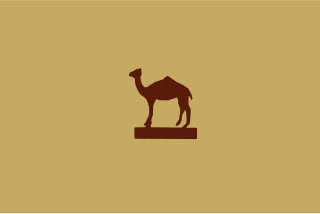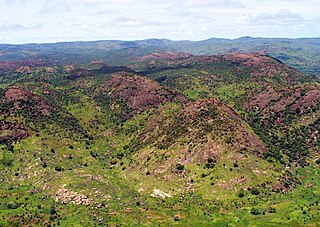Related Research Articles
Moro may refer to:

Kordofan is a former province of central Sudan. In 1994 it was divided into three new federal states: North Kordofan, South Kordofan and West Kordofan. In August 2005, West Kordofan State was abolished and its territory divided between North and South Kordofan States, as part of the implementation of the Comprehensive Peace Agreement between the Government of Sudan and the Sudan People's Liberation Movement. West Kordofan was reestablished in July 2013.

The Nuba Mountains, also referred to as the Nuba Hills, is an area located in South Kordofan, Sudan. The area is home to a group of indigenous ethnic groups known collectively as the Nuba peoples. In the Middle Ages, the Nuba mountains probably had been part of the Nubian kingdom of Alodia. In the 18th century, they became home to the kingdom of Taqali that controlled the hills of the mountains until their defeat by Mahdi Muhammad Ahmad. After the Mahdi's defeat by the British, Taqali was restored as a client state. Infiltration of the Messiria tribe of Baggara Arabs has been influential in modern conflicts. Up to 1.5 million people live in the mountains mostly ethnic Nuba and small minority of Baggara.

The Nuba people are various indigenous ethnic groups who inhabit the Nuba Mountains of South Kordofan state in Sudan, encompassing multiple distinct people that speak different languages which belong to at least two unrelated language families. Estimates of the Nuba population vary widely; the Sudanese government estimated that they numbered 2.07 million in 2003.
The Dilling are an ethnic group of the Nuba peoples. The Dilling number several thousand and live mainly in the Nuba Mountains of South Kordofan state, in southern Sudan.
Kanga is an ethnic group of Sudan. They number about 10,000 persons. They live in Northern Sudan in the Nuba Mountains and are one of the people called "Nuba". The Kanga speak Kanga, a Nilo-Saharan language.

The Moro Nuba are a sub-ethnic group of the Nuba peoples in the Nuba Mountains of South Kordofan state, in southern Sudan. Many members of this ethnicity are Christians. The population of this ethnicity possibly does not exceed 100,000.
The Keiga Jirru are a Nuba peoples ethnic group in the Nuba Mountains of South Kordofan state, in southern Sudan.
Lafofa is an ethnic group among the Nuba people of Sudan. It likely numbers less than 10,000 persons. This minority is mainly Muslim. Many of them speak Arabic. The traditional language is Lafofa, a Niger–Congo language. They live in South Kurdufan.

The Messiria, known also under the name of Misseriya Arabs, are a branch of the Baggara ethnic grouping of Arab tribes. Their language is the Sudanese Arabic. Numbering over one million, the Baggara are the second largest ethnic group in Western Sudan, extending into Eastern Chad. They are primarily nomadic cattle herders and their journeys are dependent upon the seasons of the year. The use of the term Baggara carries negative connotations as slave raiders, so they prefer to be called instead Messiria.
The Otoro Nuba are an ethnic group in the Nuba Mountains of South Kordofan state, in southern Sudan.
The Talodi are a sub-ethnic group of the Nuba peoples in the Nuba Mountains of South Kordofan state, in southern Sudan. They likely number more than 1,000 people.

Tomo Križnar is a peace activist, notable for delivering video cameras in Southern Kordofan to the local ethnic Nuba civilians in order to help them collect the evidence of North Sudan military's war crimes against them. He wrote several books. He was also a special envoy of then Slovenian president Janez Drnovšek for Darfur.
The Keiga people are a sub-ethnic group of the Nuba peoples in the Nuba Mountains of South Kordofan state, in southern Sudan. The population of this ethnicity likely is below 10,000. They speak Keiga, a Nilo-Saharan language. The language belongs to the Kadugli–Krongo family.
The Hill Nubian languages, also called Kordofan Nubian, are a dialect continuum of Nubian languages spoken by the Hill Nubians in the northern Nuba Mountains of Sudan.
Karko is a Hill Nubian language spoken in the northwestern Nuba Mountains in the south of Sudan. It is spoken by around 7,000 people in the Karko hills, 35 km west of Dilling, including Dulman. Ethnologue reports that speakers of Karko are shifting to Sudanese Arabic.
Dilling is a Hill Nubian language spoken in the northwestern Nuba Mountains in the south of Sudan. It is spoken by around 11,000 people in the town of Dilling and surrounding hills, including Kudur. Ethnologue reports that Dilling is moribund, with only older adults speaking the language and not using it with their children. All speakers also use Sudanese Arabic. The Dilling call themselves Warki, while the Dilling speakers of Kudur call themselves Kwashe. Another ethnic minority that speak Dilling are the Debri people, a group of several thousands from South Kurdufan in Sudan
Wali is a Hill Nubian language spoken in the northwestern Nuba Mountains in the south of Sudan. It is spoken by around 9,000 people 12 km northeast of Katla. Ethnologue reports that use of Wali is vigorous and that there are many monolingual speakers. Young children speak English and Wali, but it is expected that the next generation will continue to communicate using Wali.
Kafi's Story is an ethnographic film about life of Nuba ethnic people in Sudan, directed by Amy Hardie and Arthur Howes.
Jalila Khamis Koko is a Sudanese teacher and activist. In March 2012, she was detained by the Sudanese National Intelligence and Security Service (NISS) and accused of treason. After a 10-month detainment, she was released in January 2013. In December 2013, Khamis was awarded the Delegation of the European Union to Sudan's "Heroes for Human Rights Award 2013".